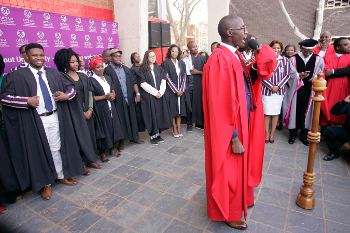Latest News Archive
Please select Category, Year, and then Month to display items
12 October 2020
|
Story Arina Engelbrecht
|
Photo Supplied
 Arina Engelbrecht from Organisational Development and Employee Well-being believes physical activity has a number of benefits for one’s health, including stress relief.
Arina Engelbrecht from Organisational Development and Employee Well-being believes physical activity has a number of benefits for one’s health, including stress relief.
Being physically active plays a big role in preventing the development of mental-health problems and in improving the quality of life of people experiencing mental-health problems.
Treatment for depression
Physical activity can be an alternative treatment for depression. It can be used as a stand-alone treatment or in combination with medication and/or psychological therapy. It promotes all kinds of changes in the brain, including neural growth, reduced inflammation, and new activity patterns are formed that promote feelings of calm and well-being. It releases endorphins – powerful chemicals in the brain that energise your spirit and make you feel good.
Physical activity can be very effective in relieving stress. Research in adults has found that physically active individuals tend to have lower stress levels compared to individuals who are less active. It also leads to improved sleep. When a person sleeps better and feels more rested, overall quality of life improves. They cope better with daily life stressors.
Reduce Alzheimer's risk
Regular physical activity can reduce your risk of developing Alzheimer's disease by up to 50%. It can also slow down further deterioration in those who have already started to develop cognitive problems. It stimulates the brain’s ability to maintain old connections as well as to make new ones.
A study asked people to rate their mood immediately after periods of physical activity (e.g. going for a walk/run, cycling, doing housework) and periods of inactivity (e.g. reading a book or watching television). Researchers found that participants felt more content, more awake, and calmer after being physically active compared to after periods of inactivity.
In conclusion, people who are physically active feel a sense of well-being, feel more energetic throughout the day, sleep better at night, have sharper memories, and feel more relaxed and positive about themselves and their lives.
“Being physically active not only changes your body, it changes your mind,
attitude, and your mood.” – Arina Engelbrecht
Bloemfontein Campus SRC announced
2017-09-01

Asive Dlanjwa, Student Representative Council President for the
2017/2018 term addressing the crowed at the Steve Biko Building
on the Bloemfontein Campus.
Photo: Johan Roux
The 2017/2018 Student Representative Council (SRC) for the Bloemfontein Campus of the University of the Free State was announced yesterday, 31 August 2017.
The election process on both the Bloemfontein Campus and the Qwaqwa Campus was overseen by the Independent Electoral Commission of South Africa. “My greatest responsibility is to ensure that we improve access and that we deal with all forms of exclusion,” said Asive Dlanjwa, President-elect for the 2017/2018 SRC term.
Bloemfontein Campus elective portfolios:
President: Asive Dlanjwa
Vice-President: Letlhogonolo Boikanyo
Secretary: Siphokhazi Tyida
Treasurer: Ntombi Nhlapo
Arts & Culture: Lwanda Jack
Sport: Yanelisa Nyalambisa
Transformation: Kamohelo Maphike
Student Accessibility and Support: Sibongile Mpama
Media and Marketing: Kgotatso Nonyane
First-generation students: Lorraine Chauke
Legal and Constitutional Affairs: Athenkosi Koti
Student Development and Environment: Lefa Makara
Bloemfontein Campus ex officio portfolios:
International Affairs: A Kwenda
Dialogue and Associations: Y Xatasi
Student Media: T Fray
Postgraduate Council: M Makhetha
On-campus Residences: S Dwaba
Day Residences: B McPherson
Civil and Social Responsibility: E du Toit